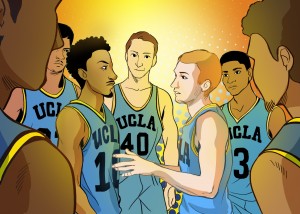Junior guard Bryce Alford has made headlines since he was in high school, but truly burst onto the national stage last March when UCLA broke brackets during the 2015 NCAA Tournament. Now one of the few leaders on the Bruins, Alford is transitioning onto a new, national stage.
He’s been called out and called names for the entirety of his three-year UCLA men’s basketball career. A daddy’s boy. Overrated. Lucky. Slowly, though, Bryce Alford has begun coming into his own and coming out of his father Steve Alford’s shadow.
While not an elite player, for the past two seasons junior guard Bryce Alford has kept the Bruins alive the best way he knows how – hitting shots. With six games left in the regular season, his team is running out of chances to make March Madness, but has Alford run out of magic? He’s been counted out before and, while he might be down, he’s far from out.
Coach’s kid

Bryce Alford was constantly in motion as a kid – following his dad from Indiana to Missouri and Iowa before finally settling in Albuquerque, New Mexico, for high school. Wherever the Alford family landed, there was always a basketball hoop for Bryce to practice on against his older brother, Kory. Even while playing in his driveway, Alford was readying himself for a big stage.
His mom, Tanya, would count down from 10 as her son dribbled frantically back and forth before hoisting a last-second shot. The imaginary buzzer sounded and Alford’s game-winner found the net while the crowd, or at least Tanya, went wild. For the coach’s kid, this was more than just a game of make-believe – Alford already had his sights set on playing in the NCAA Tournament.
It wasn’t until middle school that Alford started to realize his basketball ability and only broke out as a player in his sophomore season of high school. Quickly after that, Alford became one to watch. By his senior year, he was New Mexico’s all-time single-season scoring leader. Fans from across the state packed La Cueva High School’s gymnasium to take in Alford’s prolific scoring – the point guard averaged 37.7 points per game with 8.5 rebounds and 6.4 assists in his final high school season.
“We’d sell out gyms and stuff like that just because of the numbers I was putting up. But it was nothing, really, nationally whatsoever,” Alford said. “I wasn’t a five-star recruit or let alone a four- or three-star recruit. I wasn’t even ranked – I never saw a number by my name or anything. I’ve always had that kind of chip on my shoulder.”
Despite the lack of attention from college coaches, Alford’s vision never wavered. He still pictured himself in the midst of March Madness. So when Steve Alford got the head coaching position at UCLA in 2013, the family packed up its life and moved with him – meaning Bryce found himself on the roster at one of the nation’s most storied college basketball programs. Pundits across the country denounced Steve Alford’s decision to play his son, but Bryce Alford got to work, quietly proving them wrong.
“I’ve always been a very confident kid, but when I was little, to be able to say that I was going to be at UCLA and be a starting point guard and be to back-to-back Sweet 16s and stuff, I don’t know if I ever – I mean, I dreamed about it – but I don’t know if I ever really thought I’d get this far,” Alford said.
King of clutch

As a freshman, Alford found himself on a squad stacked with talent. Two years later, he casually name drops the 2014 team’s leaders: Kyle, as in Kyle Anderson, now an up-and-comer with the San Antonio Spurs; Norman, being Norman Powell whose name currently graces the Toronto Raptors roster and Zach, or Zach LaVine, most recently the back-to-back winner of the NBA All-Star Dunk Contest.
That team was probably the deepest the Bruins have been in Alford’s college career – UCLA won the Pac-12 tournament that year and made a strong run to the Sweet 16. Alford still managed to string together a respectable rookie season in the midst of the Bruins’ success, averaging eight points and 2.8 assists per game while coming off the bench to relieve Powell.
It wasn’t until Alford’s sophomore year that he began to take control – entering the starting lineup and putting up significant numbers. With Powell being less of a vocal leader than Anderson had been on the court, Alford assumed the role of floor general.
With the 2015 season in doubt heading into February, Powell called out his team for not giving as much as he and Alford did.
“You gotta show some energy, some heart, some toughness, get in their face, pressure them, whatever it takes,” Powell said after the Bruins returned from an Oregon road trip with two losses. “It’s just hitting the switch to get everybody on the same page and fighting just as hard as me and Bryce – the leaders – are.”
It wasn’t just his teammates’ attention that Alford had caught. By the time the Bruins entered the NCAA Tournament, even the New York Times had picked up on his story. The scrutiny wasn’t all that new for the sophomore – from the moment he arrived in Westwood, his name had made headlines for all kinds of reasons.
“I try to ignore as much of (the media attention) as I can because I’ve seen both sides of it,” Alford said. “It’s very drastic – either I’m getting as much hate as possible or I’m getting praise like, “This dude’s the next whatever.” So there’s really never a middle ground where I can just be playing basketball and nobody notices or nobody says anything.”
The exclamation point to Alford’s breakout season was undoubtedly the Southern Methodist game on March 19, 2015. UCLA snuck into the tournament amidst cries of prestige bias, but hung on until the second round where pundits everywhere predicted the Bruins would be knocked out. An 11th-seed taking on 6th-seeded SMU, it looked like UCLA’s roller coaster season was nearing the end of its ride.
That’s when Bryce Alford happened. The sophomore poured in 27 points on 9-of-11 shooting, but the only shot that mattered was the one he didn’t make.
With 13 seconds to play and his team down 59-57, Alford launched a last-ditch attempt from beyond the left side of the three-point arc. The ball clanked off the rim harmlessly, but a whistle blew instead. Goal tending. UCLA advanced to the Sweet 16 with a 60-59 upset win.
Prime time

Sometimes, it doesn’t go Alford’s way. The junior is prone to off-nights – particularly on the road. Alford had to field a lot of questions about his playing ability in January after a particularly rough road trip to Washington opened UCLA’s conference play with an 0-2 record.
Despite putting up the best numbers of his collegiate career – 16.4 points, four rebounds and 5.5 assists per game – Alford’s consistency leaves plenty to be desired. He can shoot 60 percent in a game just as easily as he can shoot 20 percent and his turnovers were an issue in the early season.
But Alford still has the ability to captivate a national audience by pulling off the improbable, if not the impossible.
On Jan. 7, people questioned if Alford was truly the real deal after he shot 23 percent on the Bruins’ conference-opening Washington road trip. Alford answered with 25 points against then-No. 7 Arizona, punctuated with a made 3-pointer as time expired to secure the upset.
“I haven’t said it publicly probably enough, I probably shy away from that, but he’s in his junior year now and he’s one of our players,” Steve Alford said, following the win over Arizona. “He’s proven himself. He’s a tough kid, he’s a really tough kid.”
The biggest wins of the season, however – UCLA’s upsets over Kentucky and Gonzaga – were ones in which Alford took more of a backseat, scoring 15 and 13 points respectively.
“The individual moments are stuff I’ll remember forever, but just the stuff that we accomplished as a team, (such as) going to back-to-back Sweet 16s … (and) then last year to have my individual impact on us get us into the Sweet 16, it’s something that I’m always going to remember,” Alford said.
His team-centric mentality is one that has evolved over the course of the past three seasons. Instead of fighting for minutes or looking to score, Alford now has greater responsibilities that take place off the court.
“There’s a lot that goes into (being a leader) that’s really behind-the-scenes – from sending text messages to the team after a loss … or just bringing individuals aside after a game,” Alford said. “From our walk-ons that hardly even have to do anything in practice … all the way up to our starters. Everybody has to be at their best for us to be as good as we can be.”
